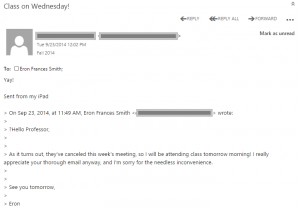If you’re a prospective student, you’re probably spending a lot of time wondering what college will be like. Maybe you’re wondering about your future social life, living away from home, or what clubs or organizations you’ll try/join/hate. As we collegefolk get ready for the spring semester and as you gear up for your college acceptances and decisions, I felt this would be the best time to address one of the main things that can make or break your college experience: professors.

Many people will tell you — correctly — that your college experience is more than just what happens in the classroom, but few would deny that academic learning is an enormous part of college.
Professors are the people who directly provide you with this part of your college education, which can result in a lot of tension or pressure in your relationships with them. An email or a side comment from a professor can either make your day or make you cry. A great class can make your semester your best one yet or ruin it. I’ve experienced all of these things to a certain degree, and I’d be surprised if any of my fellow students haven’t as well.
My first semester, I went through a really brutal breakup. One professor gave me chocolate — and offered to go find my new ex and punch him, if I recall correctly — and another gave me another try at a major presentation I was supposed to do that morning.
My third semester, I misremembered the time of a final exam, showed up on time but frazzled, and the professor gave me an extra hour to work so that I could turn in a project that better represented my intentions.
The list goes on:
- I had an emotional breakdown in a private music lesson and my teacher responded with reassurance, a really helpful array of possible options, tissues, and a much-needed hug.
- A professor gave me the class lecture when I was the only one who showed up for the first 30 minutes of class. (To my peers’ defense, it was a class of three.)
- I sent an email to a professor saying that my conflicting commitment had been canceled, so I’d be able to attend that day’s class after all, and she sent me an email that just said “Yay!”
- I’d had a really awful day when one of my professors walked by and casually remarked that my recent paper revision was much better and quite promising for future possibilities.
It’s these sorts of things, small and large, that make my small college experience more personal and more meaningful.

At this point it also might be relevant to mention that my mother is a professor at another small liberal arts college. I say it’s relevant because long before I ever took a college midterm or final exam, asked for an extension, or stayed up late panicking about an assignment, I watched my mom frustratedly grading during the holiday break, fretting about the difficulty of an exam, ranting about administration politics, and worrying about the stress of her students or advisees. Now that we’re living in the same environment, we have more in common than ever. You know what else? She loves teaching. She likes students. I mention this because it’s even more important to remember that we can make or break a professor’s day, too.
My personal example of this comes from one of the sadder points in my college experience. I received a long email from a professor once about something I’d done in class two weeks prior that really offended them and hurt their feelings. My first response was to be really upset. I’d just spent seven hours the day before working on assignments for this class, spent a good portion of my break trying to keep up with the work, and now my professor was essentially accusing me of a personal attack, two weeks after the fact, not having mentioned anything about it at the time?
Now, over a year later, I look back and see something different. I knew from other conversations and factors that the professor was having a very difficult semester. What I did was objectively inconsiderate, and some of what I felt at the time was undoubtedly surprised embarrassment projected outward. I hadn’t meant to be noticed and certainly hadn’t meant any personal offense, but that didn’t mean my professor’s interpretation was any less valid. In a way, the most important things you can learn in college are the things you hadn’t thought about.
For the most part, your professors are paying attention to you, and they care about you. I’d argue that it’s equally important to care about them, not because they determine if you’re doing well, but because they are people. (People not too different from you, but with more education and life experience!) We are in the academic environment together.
We get slammed by an exam; the professor grades it 30 times and feels doubtful that he’s prepared us enough. We’re frustrated because that new professor clearly has never taught this class before; the professor is freaking out because she’s never taught this class before!
Why hasn’t our professor graded __? Why doesn’t our professor just __? How can our professor __? We’re drowning in thousands of assignments and “like, 20” classes. Maybe your professor personally hates you and really is so lazy, or maybe your professor is teaching “like, 20” classes, serving on zillions of committees, and also has a broken car and three sick children. Sure, we don’t know, but giving them the benefit of the doubt can’t hurt.
As you go back into your new semester or gear up for college life, try to start off by seeing your professors as, well, people. Just as with fellow students, you’ll like some better than others and some will frustrate you to no end. We all might as well start with a positive attitude and a genuine “How are you?”

